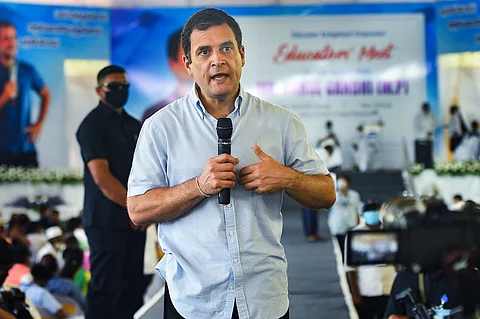

Terming the Emergency that was imposed by former prime minister Indira Gandhi a "mistake", Congress leader Rahul Gandhi on Tuesday said what happened during that period was "wrong", but it was fundamentally different from the current scenario as the Congress at no point attempted to capture the country's institutional framework.
In a conversation with Kaushik Basu, professor in the Cornell University in the US and India's former chief economic advisor, Gandhi spoke about the assault on Indian democracy, democracy within the Congress, and also about his father Rajiv Gandhi’s assassination, how it shaped him, and ultimately made him view his father’s killer’s death with empathy.
Rahul said he is all for internal democracy in the Congress, which fought for India's independence, gave the country its Constitution and stood for equality. Asked about his views on the Emergency, he said, "I think that was a mistake. Absolutely, that was a mistake. And my grandmother (Indira Gandhi) said as much."
The Emergency was imposed by Indira Gandhi for a 21-month period from 1975 to 1977, when curbs were imposed on the fundamental rights of citizens.
Asked about Indira Gandhi announcing elections at the end of the Emergency and Pranab Mukherjee telling Basu later that she did so as she thought she might lose and wanted to put that to test, the former Congress chief said there is a fundamental difference between what happened during the Emergency, which "was wrong", and what is happening in the country now.
"The Congress party at no point attempted to capture India's institutional framework and frankly, the Congress party does not even have that capability. Our design does not allow us that and even if we want, we cannot do it," he said.
Gandhi alleged that the Rashtriya Swayamsevak Sangh (RSS) is doing something "fundamentally different" and filling up the institutions of the country with its people."So, even if we defeat the BJP in the election, we are not going to get rid of their people in the institutional structure," he said.
Gandhi recalled a conversation with former Congress chief minister of Madhya Pradesh Kamal Nath before his government was overthrown. Nath told him that senior bureaucrats in his government would not listen to him as they were RSS people and would not do something that they were asked to do.
"So, it is fundamentally different what is going on," he said.
The former Congress President went on to say that people sitting in constitutional posts do not perform their duties, as he attacked Kiran Bedi, the former LG of Puducherry, and Manipur Governor Najma Heptulla. "MPs from Manipur say their Governor doesn't do her job, thinking that she holds an ideological post, not the constitutional one, while the former Puducherry Lt. Governor openly subverted the democratic process by not allowing bills to pass as she belonged to the RSS," he said.
On internal democracy within the Congress, Gandhi said he is the one who pushed for elections in the party at the Youth Congress and NSUI levels, but was criticised and attacked by his own party leaders. He wondered why nobody raises questions on why there is no internal democracy in the Bharatiya Janata Party (BJP), the Bahujan Samaj Party (BSP) and the Samajwadi Party (SP) and said such questions are asked about the Congress as it is an "ideological party" and has the ideology of the Constitution. "Therefore, it is more important for us to be democratic," he said.
He also said he wondered why nobody raises questions on why there is no internal democracy in the Bharatiya Janata Party (BJP), the Bahujan Samaj Party (BSP) and the Samajwadi Party (SP) and said such questions are asked about the Congress as it is an "ideological party" and has the ideology of the Constitution. "Therefore, it is more important for us to be democratic," he said.
Asked about how he felt about the assassination of his father, former prime minister Rajiv Gandhi, in May 1991, he said it made him “understand violence.” He added said he saw his father's death coming as he was fighting many forces at the time.
“For me, at the time, I saw my father fighting forces that were much bigger. I sort of sensed before my father died, that this was not going to end well. What was worse for me was seeing my father walking towards his death. It was worse than his death, in fact.”
The former Congress chief said that this experience shaped him fundamentally, and was “painful”, but gave him “gifts” of understanding things he would not have, otherwise.
“It made me understand violence. It made me understand the other. So, I remember, it was strange thing, I saw my father's killer (Prabhakaran) lying on a beach in Sri Lanka, and I felt bad for him. I was really upset for him. He is somebody else's father, there’s someone else looking at him now the same way that I looked at violence. So, when someone talks about violence, I sort of sit quietly and say you don't actually understand violence. That's why you are so enamoured by it. It has never actually struck you," Gandhi said.
"When Prabhakaran (LTTE leader) died, I picked up my phone and called my sister and said Priyanka it is strange that I am feeling bad. I should be happy about this. But I am just disturbed that why are they humiliating the man like this. And my sister said to me, ‘I am feeling the same way,’" he added.
(With PTI and IANS inputs)